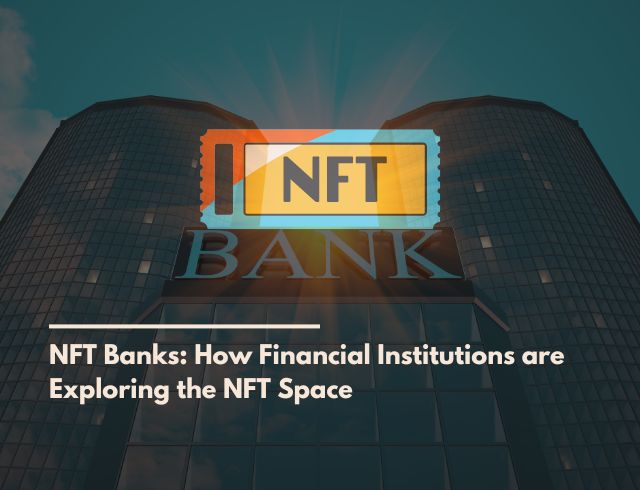

In the landscape of various forms of virtual assets. NFTs or Non-Fungible Tokens have emerged as the pillars of changing ownership in the digital world. NFT is now popular in many fields; from art pieces to virtual land. Who could have thought even some years ago that one of the recent trends to embrace? The NFT universe will be the traditional banking and financial institutions. NFT banks or the incursion of NFTs by banks symbolize an increasing tendency to integrate decentralized digital assets into the centralized financial space.
Here are some key ways banks are exploring NFTs:
- NFT Custody Services: First of all, the collector’s main concern is the security of digital assets collected in the form of NFT. As has been seen, traditional banking facilities offer safe spaces and services for valuable physical assets. Banking facilities are now and in the future will extend services in the safe custody of NFTs. This enables collectors to keep their inventory safe. And at the same time enjoy the security that originates from conventional banking.
- Collateralized Loans Against NFTs: They are gradually emerging as a valuable commodity in the world of finance as other kinds of guarantees. Banks are starting to discuss platforms. Where borrowers can use NFTs as collateral to obtain the necessary credit. Besides these, it facilitates liquidity for those who own the NFTs. It also helps the banks to expand the range of the loan products offered by them.
- Tokenized Real-World Assets: Today banks are discussing possibilities to tokenize real-life objects which are buildings, paintings, or exquisite goods based on the blockchain. Such tokenized assets may be bought and sold as non-fungible tokens, thus increasing the access of these valuable assets to an international market. It also tries to bring new prospects of fractional ownership so that anybody can own a part of a certain asset thanks to the NFT.
- NFT Investment Platforms: Investment is common with traditional banks since they have been managing investment portfolios for quite a long time and they are embracing NFT investment. Banks can propose NFT funds or portfolios meaning that customers invest in a selection of digital assets. This makes NFT investing less mysterious to new players within the blockchain realm or space.
Why Are Banks Interested in NFTs?
NFTs were primarily known as a tool for art but they can be used in numerous other related use cases. Banks are interested in NFTs for several reasons:
- New Revenue Streams: Banks can thus consider using NFTs as it creates an opportunity to enter a new but growing market. In this way, banks can create additional profit centers around NFTs and related services such as custody, lending, and investments.
- Expanding Client Services: Extending and providing services of NFTs also means that banks are appropriate to the needs of the clientele by following the market trends in technology, show business, and creative industries that are most active in NFTs.
- Blockchain Integration: A growing number of banks are currently in the process of researching and experimenting with blockchain technology for uses such as foreign transfers, contracts, and supply chains, respectively. Services take NFT to the next level to use this technology to grow their services and give them a new dimension.
The Implication of Platforms such as Bermuda Unicorn
Getting back to the given topic of how banks are getting involved in NFTs. Companies such as Bermuda Unicorn are standing as trailblazers in the digital asset space right now. Bermuda Unicorn is one of the biggest NFT marketplace and virtual galleries. Where creators, collectors, and investors can safely interact with NFT. Including such functions as 3D microblogging and virtual exhibit space for collections. Bermuda Unicorn is the best link between classical finance and the new NFT universe.
Future of NFT Banks
However, there are still a lot of problems with the connection between the traditional banks and the NFTs. There’s a big potential for further development. That is why we can predict further expansion of various services and products related to digital assets. As more financial establishments notice the prospects of NFTs. Here are some potential developments in the future of NFT banks.
- Increased Institutional Investment: As institutional investors decide to invest in cryptocurrencies. Banks are bound to be significant stakeholders in NFTs. This will add more credibility to the NFTs as a form of asset class and more investors will be attracted to it.
- Regulatory Frameworks: Given that NFTs are still considered novel by many major banks. It only indicates that regulatory authorities will also have to define the specific concerns. That relates to such assets shortly. Some of the areas of concern are those to do with owning property rights, taxation, and anti-money laundering (AML) rules.
- Integration with Decentralized Finance (DeFi): A new angle for incorporating NFTs is with the use of DeFi technologies wherein the exchange of digital assets. Can be done in decentralized lending, borrowing, and trading. Thus, banks may want to build cooperation with DeFi platforms or create their solution to leverage this trend.
Conclusion: Banks and NFTs
The combination of NFTs with conventional banking systems instills a new-age market frontier in the financial industry. As evidenced by safe custody services and NFT-based loans. To physically backed tokens and asset tokenization. There is much more that banks are actively seeking in the realm of digital assets. Given the current dynamics of players like Bermuda Unicorn creating safe shelters for NFTs, one can expect a sunny day ahead for NFT banks.
As financial institutions navigate this new landscape, one thing is clear: NFTs are not merely a fad that has sprouted due to the hype around cryptocurrencies, but they are part of a growing ecosystem around the digital economy.